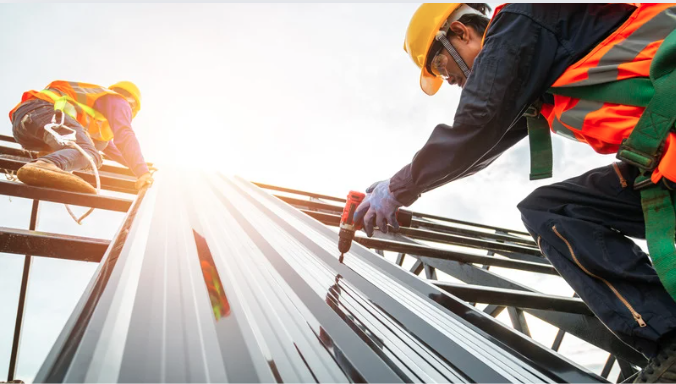
Metal roofing has emerged as a popular choice for commercial buildings, offering durability, energy efficiency, and modern aesthetics. As businesses strive for sustainability and longevity, understanding the various types of commercial metal roofing becomes essential. From classic corrugated panels to sleek standing seam systems, each type presents unique benefits tailored to different architectural needs and environmental considerations. This exploration not only highlights the diverse materials and styles available but also delves into the impact of these roofs on energy savings, maintenance, and overall building performance. Join us as we unpack the world of commercial metal roofing and its transformative potential.
Types of Commercial Metal Roofing
When it comes to commercial metal roofing, there is a variety of materials and designs tailored to meet the specific needs of businesses. Metal roofing is favored for its durability, longevity, and aesthetic appeal. Below are five types of commercial metal roofing, each with unique characteristics suited for different applications.
1. Standing Seam Metal Roofing
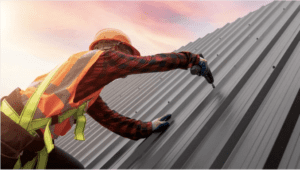

Standing seam metal roofing features raised interlocking seams that run vertically along the roof. This design provides excellent water drainage and minimizes the risk of leaks. It is known for its sleek appearance and is often favored for its modern look and energy efficiency.
2. Corrugated Metal Roofing
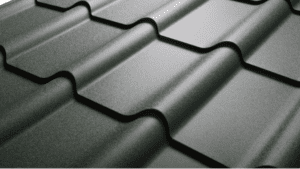

Corrugated metal roofing is characterized by its wavy, ribbed pattern. It is lightweight and easy to install, making it a popular choice for industrial buildings and warehouses. Its design offers strength and durability, while also being cost-effective for larger projects.
3. Metal Shingle Roofing
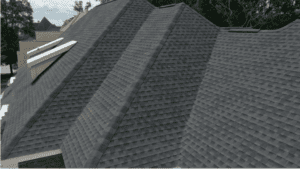

Metal shingle roofing mimics the appearance of traditional shingles while providing the benefits of metal. Available in various styles and colors, this type is suitable for businesses looking for a more aesthetically pleasing option. It combines the charm of classic roofing with the robustness of metal.
4. Metal Tile Roofing
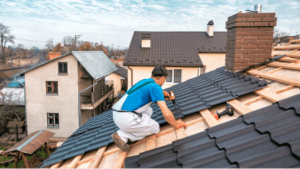

Metal tile roofing gives the look of traditional tile but with all the advantages of metal. It is often used in commercial buildings that want to maintain a classic or Mediterranean aesthetic. This type is designed to withstand extreme weather conditions, ensuring longevity and performance.
5. Galvanized Steel Roofing
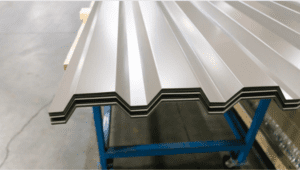

Galvanized steel roofing is composed of steel coated with a protective layer of zinc, making it resistant to rust and corrosion. It is an excellent option for industrial facilities and warehouses, offering strength and durability at an affordable price. Its reflective surface also aids in energy efficiency.
Each of these types of commercial metal roofing provides distinct benefits, allowing businesses to choose the option that best meets their needs, budget, and aesthetic preferences.
How to Choose the Right Metal Roofing Contractor?
Choosing the Right Metal Roofing Contractor for Commercial Metal Roofing
Selecting the right metal roofing contractor for your commercial property is crucial to the success and longevity of your roofing project. Here are several key factors to consider when making your choice:
1. Experience and Expertise: Look for contractors who specialize in commercial metal roofing. Check their portfolio for past projects and ensure they have experience with the specific type of metal roofing you are considering, such as standing seam, metal shingles, or corrugated panels.
2. Licensing and Insurance: Verify that the contractor is properly licensed to operate in your area and carries adequate insurance. This protects you from potential liability in the event of accidents or property damage during the roofing process.
3. Reputation and References: Research the contractor’s reputation by reading online reviews and seeking references from previous clients. A reputable contractor should be willing to provide testimonials and examples of their work.
4. Written Estimates and Contracts: Obtain detailed written estimates from multiple contractors. This should include pricing, materials, timelines, and payment schedules. A clear, detailed contract helps ensure that all parties are on the same page regarding the project’s expectations.
5. Material Options: Discuss the different metal roofing materials available and their respective warranties. A knowledgeable contractor should guide you in selecting the best materials that fit your needs, budget, and aesthetic preferences.
6. Warranty and Aftercare: Inquire about warranties offered on both the materials and workmanship. A reliable contractor should provide assurances that cover potential defects and issues that could arise after the installation.
7. Local Knowledge: Choose a contractor familiar with local building codes and regulations. This is important to ensure compliance with all legal requirements, which can vary by location.
8. Communication and Professionalism: Effective communication is essential for a successful project. Choose a contractor who is responsive, professional, and willing to address any questions or concerns you may have throughout the process.
By carefully considering these factors and conducting thorough research, you can find a metal roofing contractor who will deliver high-quality work that meets your commercial roofing needs.
Metal Roofing Maintenance Tips
Essential Maintenance Tips for the Longevity of Commercial Metal Roofing
To ensure the longevity of your commercial metal roofing, implement the following maintenance practices:
1. Regular Inspections: Schedule routine inspections at least twice a year, particularly after severe weather events, to identify any potential issues early.
2. Clean Debris: Remove leaves, branches, and debris from the roof surface and gutters regularly to prevent water accumulation and rust.
3. Check for Rust: Inspect the metal for signs of rust or corrosion. Address any spots immediately with appropriate rust treatments and re-coating.
4. Inspect Seams and Fasteners: Regularly check seams and fasteners for tightness and signs of wear. Replace any damaged fasteners and repair any loose seams to prevent leaks.
5. Apply Protective Coatings: Consider re-coating your metal roof with a protective layer every few years to enhance its resistance against corrosion and UV damage.
6. Maintain Drainage Systems: Ensure that gutters and downspouts are clear of obstructions and function properly to facilitate proper water drainage.
7. Addressing Punctures and Dents: Repair any punctures, dents, or damage as soon as possible to prevent moisture intrusion and maintain the roofing system’s integrity.
8. Trim Overhanging Trees: Cut back branches from trees that overhang the roof to prevent damage and reduce debris accumulation.
By following these maintenance tips, you can extend the life of your commercial metal roofing and ensure long-term performance and protection for your facility.
Why Choose Metal Roofing Orlando, FL?
When it comes to commercial roofing solutions, Metal Roofing Orlando stands out as a premier choice for Orlando businesses. Its unparalleled durability, energy efficiency, and low maintenance requirements make it an ideal investment for your commercial property. With the extreme weather conditions often experienced in Florida, opting for a metal roof protects you against the elements while also benefiting from long-term cost savings. Moreover, the aesthetic appeal of metal roofs can enhance your building’s appearance, providing a modern and professional look.
Don’t miss out on the opportunity to secure your business with a reliable roofing solution. Choose Metal Roofing Orlando and enjoy peace of mind knowing your property is shielded by one of the best roofing options available.
Take action today! Contact us for a consultation and see how we can meet your roofing needs.
